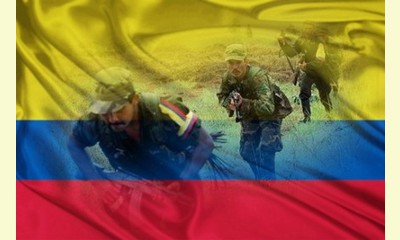|
|
Colombian Govt and FARC Reach Agreement on First Stage of Peace Talks
un article par Latino Daily News
The Colombian government and the FARC guerrillas
announced here Sunday that they have reached an
agreement on the issue of land, the first point on
the agenda created for the peace talks they are
pursuing in the Cuban capital.

Foto: FARC Guerillas
click on photo to enlarge
The agreement was made public in a formal ceremony
at the Conventions Palace in Havana in the
presence of negotiators from the Colombian
government and the Revolutionary Armed Forces of
Colombia, or FARC, as well as representatives of
the talks’ guarantor nations of Cuba and Norway
and observer states Venezuela and Chile.
The parties reached agreement on issues such as
access to and use of land, idle or unproductive
land, determining property rights and protection of
the Reserve Zone, according to a joint communique.
Colombia and the FARC also reached consensus on
development programs with a territorial focus,
infrastructure and rural social development in
areas such as health care, education, housing and
the eradication of poverty.
The joint communique said that the agreement is
“the start of radical transformations in
Colombia’s rural and agrarian reality with equity
and democracy,” and it “focuses on the people, the
small producer, access and distribution of land
and the fight against poverty, stimulating
agricultural production and reactivating the rural
economy.”
Colombian President Juan Manuel Santos said that the
accord was a “fundamental step toward a full
agreement to put an end to half a century of
conflict,” and Colombian Senate chief Roy Barreras
called it “a great historic and irreversible step.”
(Click here for an article in Spanish on this subject.)
|








|
DISCUSSION
Question(s) liée(s) à cet article:
What is happening in Colombia, Is peace possible?
* * * * *
Commentaire le plus récent:
The force of non-violence constrains the force of arms!
Colombia - the force of peaceful resistance -
At the beginning of July, the rebels of the armed revolutionary forces of Colombia (FARC) kidnapped a 51 year old Swiss, and his Colombian assistant who worked in the Indian communities of Cauca province where they were setting up development projects by building schools and community production enterprises.
The news of the kidnapping was spread through all the villages and 2000 Indians set out to pursue the 400 guerillas. They reached them at an elevation of over 4000 meters (12,000 feet), encircled them, and without any weapon, constrained them to release the 2 hostages! (After 2 days, the hostages were released).
This release, obtained through "peaceful resistance" has raised a national debate: the possibility of resisting violence without needing to use weapons has demonstrated the effectiveness of human solidarity movements.
"I will return, and I will then be millions" prophesied the Aymara Indian leader Tapak Katari, in 1781, at the time of his execution by the Spanish conquistadors.
100 million in 1492, the Indians were no more than 4,5 million one century and half later. Currently there are 44 million Indians populating Latin America.
In spite of their great diversity, the Indian movements take on more and more importance. In Ecuador, Guatemala, Bolivia, Peru, Mexico or Colombie they are opposed to the neoliberal system that governs the Americas, while protesting against the imposition of the American economic market. . ... continuation.

|
|









